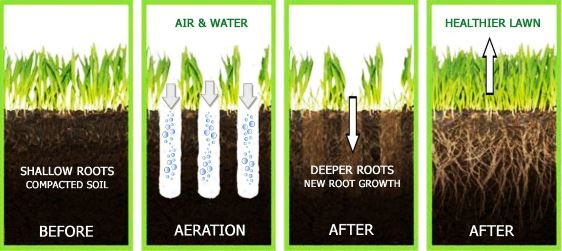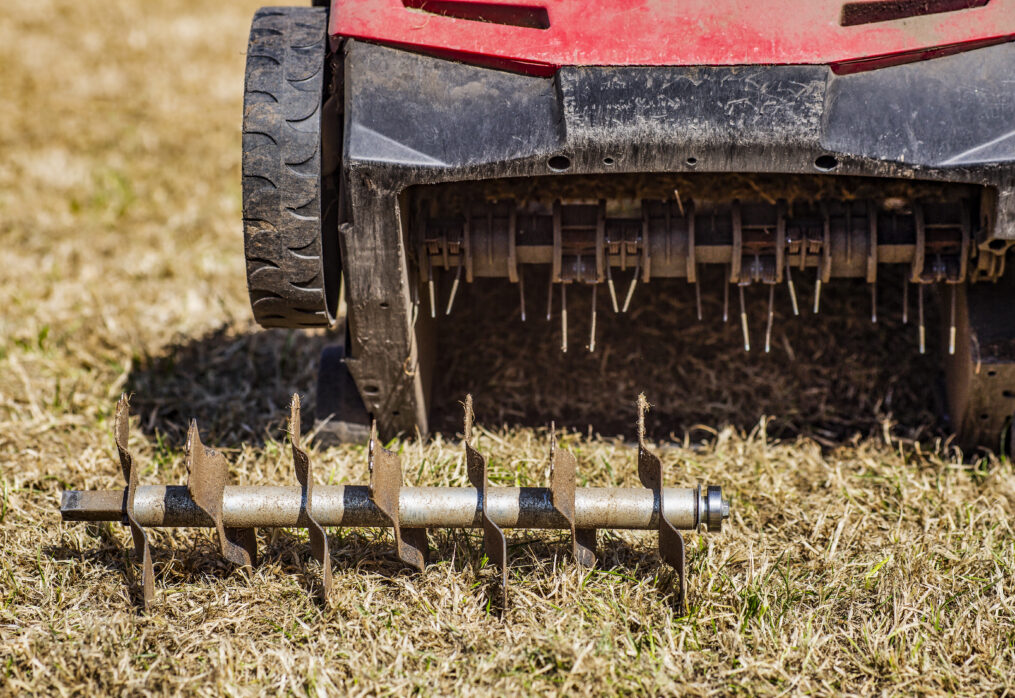Why Lawn Aeration is Important
Why Lawn Aeration is Important
Whether in the spring or the fall, depending on where you live, homeowners should aerate their grass once a year. The reason is that aeration is one of the best things you can do for your grass. Using specifically made equipment, core aeration—the removal of tiny cores of soil and thatch—the layer of living and decaying organic waste—between the ground surface and green vegetation—from your lawn. Rolling over the grass, a sequence of hollow coring tines punctures its surface and methodically removes tiny dirt and thatch plugs from the ground. Eliminating these blockages allows nutrients, oxygen, and water to access grass plant root systems in a much more precise manner. Fertilizer and water utilization then start to become more efficient in turn. This helps the grass plants better handle stress generated by insects and disease through a better, deeper root system. After aeration, plugs should be kept on the grass as they contain soil microorganisms that will assist in breaking down thatch. When left on the lawn surface, these plugs vanish quickly. You might be asking why I should aerate my grass. With all the knowledge required, Balaji Nursery has got you covered!

Why Does Lawn Aeration Matter?
A good, lively grass depends on lawn aeration. Aeration reduces compaction, encourages deeper root growth, improves drainage, and increases general turf health by allowing essential oxygen, water, and nutrients to enter grass roots from tiny holes in the ground.
1. One promotes healthy grass by aeration
Aerating your grass lets important nutrients, water, sunshine, and oxygen sink in and reach the root system. This will encourage a strong and deep root system, therefore producing a lush green lawn better able to resist the invasion of unwelcome weeds and grasses.
2. Aeration Lessens Soil Compaction
This is especially important if foot activity on your lawn is relatively high. The weight and strain of the extra foot traffic from dogs, friends, and family throughout the summer can compress your grass. Pulling out the little soil cores lets your lawn release the extra strain and stress. Should you fail to release the compacted dirt, your grass will start to dry up and new growth will be denied. Should your soil be compacted, your grass will suffer from what is known as “runoff.” Therefore, when it rains or when you water your lawn, it will not be able to pass through the deep soil layer.
3. Aeration minimizes Thatch
Built between the grass and soil surface, thatch is a covering of organic dead and live shoots, stems, and roots. Although a small amount of thatch can be good, anything more than ½ an inch has to be taken off as it will lessen the sunshine, water, and nutrients that can enter the ground.
4. Aeration Encourages Fresh Growth
Before fertilizing and sowing, it is advised of homeowners to aerate their grass. This is because it increases the chances that the granules and seeds will settle and pierce the ground. Aeration guarantees additionally more space for movement and growth of the roots of your grass. For the best results, see your neighborhood Weed Man specialist. Our experts are taught to aerate at the proper moment, thereby optimizing your budget and producing the most beautiful lawn in the area. I recommend checking out:
- How to plant lawn grass: A Quick Guide
- Mowing Heights By Season And Grass Type
- What Is the Best Warm Season Grass for Your Lawn
- Natural Weed and Grass Killer Recipe for a Chemical-Free Lawn
- What type of machine is used to cut grass?
- 5 gorgeous flowering plants to bring home in summer
- 10 Stress Relieving Indoor plants for home
- 10 plants you can easily grow in a bottle
- 5 Easy Tips to Maintain a Tulsi Plant at Home
- 5 Medicinal Plants to Grow at Home
- 10 palm plants to grow at home
Last Updated on 1 week ago by Anjali Mehra Ph.D. in Horticulture (Punjab Agricultural University)
- How Long Does Lawn Grass Last After Installation? (2026 Expert Guide) - February 6, 2026
- White Ants in Lawn Grass: Causes & Permanent Solution - February 1, 2026
- Best Grass for Farmhouses in India (Low Maintenance Options) - January 20, 2026
